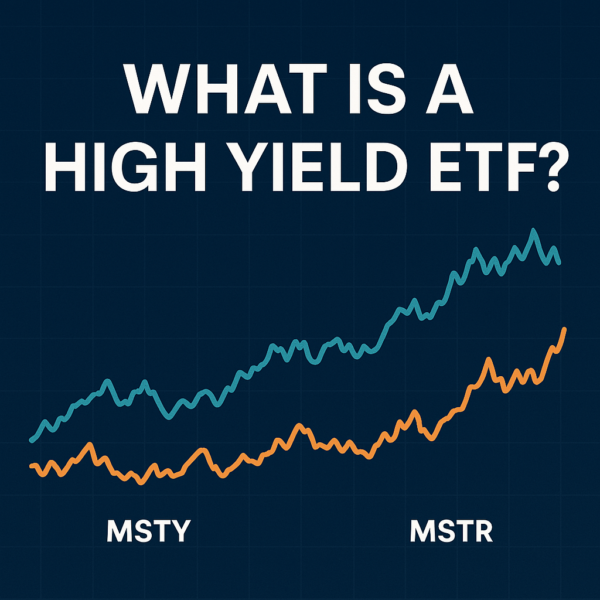Read This Before Buying any Bitcoin ETF
In January 2024, the Securities and Exchange Commission (SEC) made it legal for financial companies to release exchange-traded funds (ETFs) that can track the price of bitcoin.
In this article, I’ll break down why you should avoid buying a Bitcoin ETF at all costs – as well as my thoughts on why BTC is set to rally.
3 Reasons Why You Should Never Buy a Bitcoin ETF
They Charge Unnecessary Fees
A Bitcoin ETF is essentially just a financial tool that tracks the spot price of Bitcoin while charging you a fee to do so. But…you can easily do this yourself by opening a crypto wallet and buying Bitcoin. So, why would you pay another company to do it for you?
According to Nerdwallet, most Bitcoin ETFs charge between 0.5% to 1.5%. Now, you might think that these financial institutions are using some sort of secret strategy when tracking Bitcoin’s price. Right? Like, maybe they have a special crypto wallet that uses ultra-safe encryption technology. Nope. According to Nerdwallet, most Bitcoin ETFs on the market use Coinbase (Nasdaq: COIN). Again, this is easily something that you could do yourself – for free.
I guess it’s true that some BTC ETFs invest in futures while others invest in Bitcoin mining stocks. So, buying a Bitcoin ETF for the sake of tracking all of the BTC mining stocks might make a bit of sense. But, if you’re solely interested in getting exposure to Bitcoin then it makes zero sense to buy an ETF.
Now, I know what you’re thinking. Some of these ETFs have really cool names, like the “Bitwise Bitcoin Strategy Optimum Roll ETF”: (NYSEARCA: BITC). With a name like that, this ETF must have a unique trading strategy that outperforms Bitcoin, right?
Wrong.
Bitcoin ETFs Underperform BTC
I checked the 6-month returns of Nerdwallet’s Top 10 Best ETFs and, guess what? All 10 of them have underperformed Bitcoin’s return over the same period.
I know this is a bit of a small sample size. After all, a 6-month window isn’t very long. There’s a chance that these funds will go on to outperform BTC over the next 1 year, 5 years, or 10 years. But, I doubt it. Over the past 6 months, most of these ETFs weren’t even close to mirroring BTC’s return. They have all underperformed BTC by 20-30% or even more in some cases.
So, again, you’re essentially paying a company a fee to underperform the return of Bitcoin. On top of that, buying a Bitcoin ETF goes against everything that Bitcoin stands for.
A Bitcoin ETF is Against Bitcoin’s Ethos
If you’re a fan of Bitcoin and the decentralized finance movement then you know that bitcoin is all about people regaining control over their money. Right now, money is controlled by the government, central banks, and consumer banks.
- The government takes your money through taxation
- The central bank devalues your money through inflation
- Consumer banks determine what you can or can’t do with your money.
Whenever you want to do something with your money, one of these three entities is standing by to make your life difficult.
Didn’t pay enough taxes? Here’s the government ready to audit you and demand all of your financial information.
Saving money so that you can buy a home? Well, the Fed raised interest rates so now you can’t afford the mortgage.
Want to send money to a friend? The bank says you have to wait until Monday.
The main purpose of Bitcoin is to solve issues in our financial system and eliminate financial middlemen. In doing so, Bitcoin gives you more control over your finances. If you buy a Bitcoin ETF then you’re just perpetuating the system that already exists. Bitcoin might not be a perfect solution to all of the problems I listed above. But, it’s the best alternative we have if we want to regain control over our money.
That said, even though I’m opposed to buying a Bitcoin ETF, I still think buying Bitcoin is a great idea. Here’s why.
Bitcoin’s Pending Surge
TLDR: Trillions of dollars will soon be invested in BTC = prices goes up.
The SEC’s decision to allow Bitcoin ETFs has ushered in a new age for the cryptocurrency industry. With this new rule, Bitcoin is no longer a fringe asset that’s used by drug dealers to launder money. Instead, BTC is officially a legitimate financial product that’s certified and approved by the world’s biggest financial institutions. This is a massive context switch.
During its initial announcement, the SEC said that it approved 11 applications for BTC ETFs. Over the coming years, I’m sure that dozens more funds will enter the industry. This means that wealth advisors around the world are starting to advise their clients to buy Bitcoin and other crypto assets. This will trigger a massive influx of money into BTC.
Visual Capitalist estimates that there are 59.4m millionaires in the world. These people make up just 1.1% of the world’s population. But, they account for roughly 45.8% of the world’s wealth – which is approximately $210 trillion. The overwhelming majority of these millionaires do not manage their own wealth. When you think of the average millionaire, you conjure up images of:
- Trust fund kids whose family owns businesses, real estate, or similar assets
- Famous celebrities like actors, athletes, singers)
- High-paid professionals like doctors, lawyers, CEOs
Do you really think any of these personalities are sitting around managing their own wealth? Absolutely not.
Imagine The Rock balancing his portfolio each quarter. Or, America’s top brain surgeon buying shares of $VOO on Robinhood (Nasdaq: HOOD). Not happening. For the most part, wealthy millionaires have someone else manage their money. Usually, a family office or similar high-end wealth management service. I’m talking about the types of investment firms that require $50 million in assets just to schedule a meeting.
Over the coming years, these private family offices will start to recommend BTC ETFs to their clients. This will result in trillions of dollars of privately managed wealth pouring into Bitcoin – likely resulting in a massive spike in price. Even if just 1% of privately managed wealth is invented in Bitcoin, it will result in $2.1 trillion flowing into BTC over the coming years.
I feel especially strong about this, thanks to the great wealth transfer.
Will BTC Replace Gold?
I have a very strong conviction that Bitcoin will eventually replace gold as the world’s default “safe haven” investment. I say this because America is currently undergoing the greatest wealth transfer of all time.
Over the next two decades, Baby Boomers will transfer $84 trillion to their kids (Mainly, Millennials and Gen Z). This means that many younger generations will suddenly find themselves responsible for investing the family fortune. And, they’ll likely show a stronger preference for Bitcoin and crypto than their parents did.
Most advisors recommend keeping between 5% to 10% of your portfolio in gold. These talking points have been repeated so often that few people dare to question them. However, I think this mentality will gradually start to change over time. After all, how many younger investors are really interested in buying gold? For the most part, they only do it because “it’s what you do.”
But, you can’t spend gold. It barely increases in price (compared to other assets). You can’t even really use it, outside of jewelry or fashion pieces. BTC, on the other hand, can be easily transferred, spent, sent to friends/family, and has proven to increase dramatically in value over time. For these reasons and more, I believe that BTC will eventually replace gold as the default “safe haven” investment.
Anyway, I hope that you’ve found this article valuable when it comes to learning why you should never buy a Bitcoin ETF. If you’re interested in reading more, please subscribe below to get alerted of new articles.
Disclaimer: This article is for general informational and educational purposes only. It should not be construed as financial advice as the author, Ted Stavetski, is not a financial advisor.
About Teddy Stavetski
Ted Stavetski is the owner of Do Not Save Money, a financial blog that encourages readers to invest money instead of saving it. He has five years of experience as a business writer and has written for companies like SoFi, StockGPT, Benzinga, and more.





